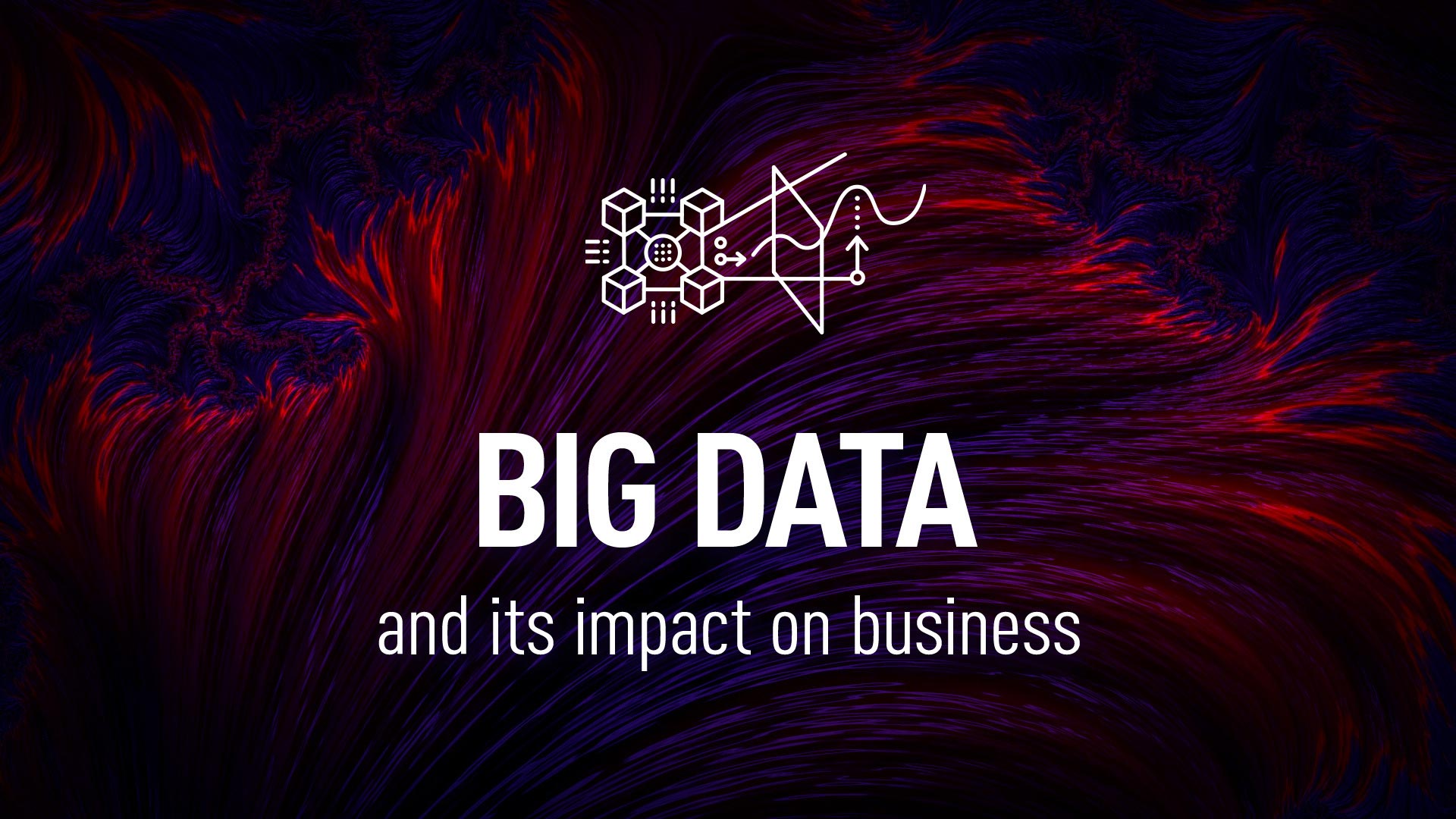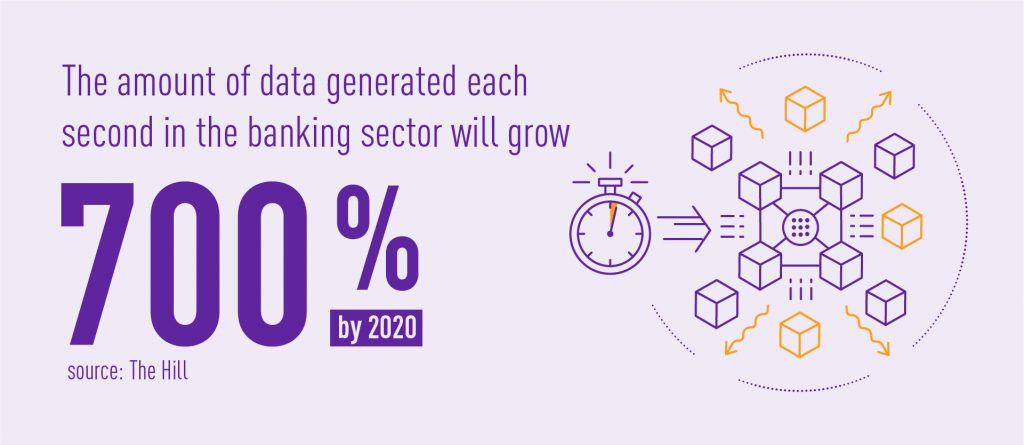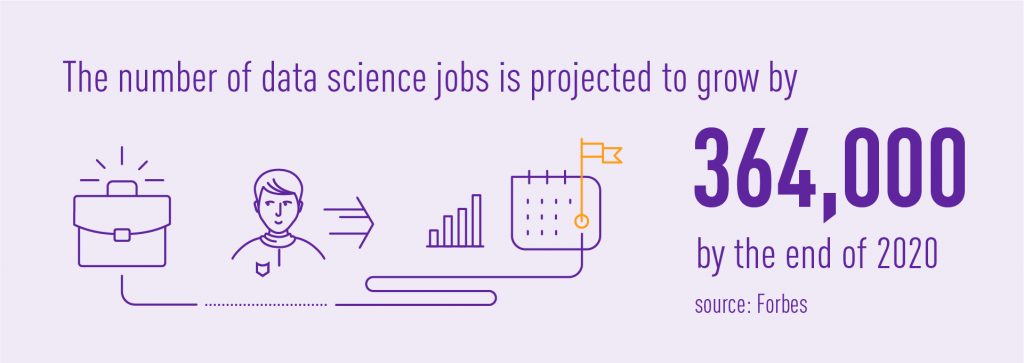Insights
- category:
Big Data impact on business

Nowadays, the consumption of information is growing massively. This information, known as Big Data, became too large and complex for traditional data processing. With the help of Big Data, companies want to improve their customer service, increase profit, reduce costs, and upgrade existing processes. Big Data’s impact on business is tremendous. Thanks to analysis and efficient management of these large volumes of data, companies can flourish in the digital economy.
How Big Data impact businesses
Data became a crucial part of understanding customers and their motivation. Every online action and interaction is gathered to be transformed into as much insight as possible. Thanks to such input, customers’ online profiles can be expanded, telling a lot about personality, behaviour, and events occurring in a customer’s life. Companies use these insights to improve their products, choose a perfect business strategy, and boost marketing campaigns.

Big Data can create new ideas for companies’ growth and expansion. In the past, companies’ strategies were created based on assumptions and a retrospective point of view. Using real-time analysis, Big Data impact on businesses can be even more lucrative than ever. Here are a few benefits of using Big Data analysis in your company.
Targeted marketing
Big Data analysis delivers highly accurate targeted marketing campaigns, which allow companies to adjust their efforts to specifically identified customers’ needs. A useful analysis can actually help with predicting what products or services customers may need in the future. Creating more customised advertisements for particular items is much easier with such knowledge. And it makes companies more proactive in listening to customers’ needs.
Proactive customer care
Thanks to Big Data analysis, you can know what your customers are going to need before they make the first move toward purchasing. Real-time analysis of data collected from multiple channels, such as social media, store visits, or browsing history, allows companies to understand their customer needs fully. Personalised customer experience is key to a satisfied customer. With such an in-depth analysis of customers’ data, companies can adjust their whole business strategy accordingly, from marketing campaigns to customer service. It also allows contacting customers if a future issue arises.

Up-selling and cross-selling
Personalisation also offers a great way to upsell products. Big Data analysis gathers all the information about customers in one place, which can be used to serve personalised recommendations even to first-time customers. This way, they are more likely to find what they want and as a result, purchase more products.
Product development
Gathering and analysing data about the customers’ needs can also be used to forecast upcoming trends. With Big Data analytics, companies can transform the gathered insights into new products and services. It allows them to predict what customers need. Taking into consideration customers’ demand, interests, or product popularity, the company can deliver data-driven proof for product development. Instead of waiting for customers to tell you what they are looking for, you can fulfil your customer’s needs like never before. Also, becoming more innovative than competitors is an additional benefit.
Efficiency improvements
Big Data allows companies to gain a full understanding of their products, so decision-making processes can optimise and change to ensure maximum operational efficiency. Operational and historical data gathered from various sources such as machine logs, social media, web, or apps can be turned into evident and actionable insights, which also can be used as an opportunity for improvement.
Cost reduction
Big Data provides insights that can reduce operational costs and optimise expenses. All the information gathered can be used to transform and improve business processes, which in turn, cut costs and increase profits. Also, with Big Data analysis, it is easier to eliminate unwanted costs and boost productivity. Big Data is helping many companies save a lot of money thanks to efficient operational cost-cutting processes.

Business security
Recent research has shown that approximately 84% of companies use Big Data to block cyberattacks. The introduction of Big Data in operations can result in a significant decline in security breaches. With the help of Big Data tools, all ransomware and malware attacks can be easily detected. They lessen the time it takes to identify and resolve a threat while also allows IT to predict future attacks and minimise or even prevent damages.
Revenue growth
Big Data can also help create new products. Companies can use the gathered insights to help their clients address their Big Data challenges, or they can start partnerships with third parties to share aggregated data. These possibilities open new revenue sources for telco, banking or insurance companies. For example, some retailers may be interested in location-based data from telecommunication companies to target their customers with personalised offers. And that is a win-win situation for both parties.
Examples of Big Data impact on businesses
Banking & Finances
Financial institutions have gone a long way in keeping up with digital innovations that have required behavioural and technological change. Over the last few years, Big Data’s use in finances helped to achieve significant technological innovations. Big Data analytics transformed the entire financial services sector.
Here are a few real-life examples of Big Data’s impact on businesses within the finance sector:
- UOB bank from Singapore uses Big Data to drive risk management. While being a financial institution, there is massive potential for losses if risk management is not well thought of. UOB bank’s Big Data risk management system enables them to reduce the time needed for calculating the risk. At first, it took about 18 hours, but with this new system, it only takes a few minutes.
- Various anti-money laundering software such as SAS AML use Big Data analysis to detect suspicious transactions and analyse customers’ data. Bank of America has been one of such software users for more than 25 years.
- The Securities Exchange Commission (SEC) is using Big Data to monitor financial market activity. They are using network analytics and natural language processors to catch illegal trading activity in the financial markets.

Retail
Trying to win the customer is a long-time battle in retail. What matters the most is excellent customer experience. Big Data enables retailers to achieve new ways of winning customers, staying ahead of the competition, and focusing on innovation.
Here are a few real-life examples of Big Data’s impact on businesses within the retail sector:
- Starbucks can open many branches within the same area and enjoy a profit from each. How? By using Big Data analytics. The company predicts the potential growth of each new location by analysing data such as location, traffic, demographics, and customer behaviours. Moreover, they gathered insights from their transactions and used this data to deliver a personalised experience to their customers.
- Costco tracks what its customers buy and when. One fruit packing business company warned Costco about the potential of listeria contamination in its fruits. Costco, instead of sending out a warning to all customers in recent weeks, was able to notify only the specific customers that bought those particular fruits.
- Back in 2012, data analysts at Target wanted to reach pregnant women before their babies were born. How? By using data about women’s shopping habits. Data analytics identified that pregnant women buy unscented lotions, cotton balls, supplements and washcloths. If a woman buys those products, it might mean that she’s close to her due date. If they can target her and encourage her to go shopping at their store before the baby is born, chances are, she’ll become an engaged customer.
Telecommunications
Telecom industry has an advantage over others due to the vast amount of data it collects in real-time. Therefore, the Big Data impact on business, in this case, is enormous. Data collection is built into the everyday operations of most telecommunications companies.
Here are a few real-life examples of Big Data’s impact on businesses within the telco sector:
- IBM has helped a leading telecom industry data analytics provider to re-engineer its market measurement product. The solution included remodelling data integration processes, workflow automation, developing new user interfaces and building reports. The whole process resulted in a new product that delivered high-quality deliverables to customers’ clients while also reducing the volume of support needed by 55%.
- Globe Telecom, based in the Philippines, needed a better way to attract and retain value-conscious mobile customers. The company teamed with IBM and Nokia to deploy an SOA-based service creation and delivery platform that helps to create targeted customer promotions rapidly.
- TUATARA’s cooperation with Omantel is an excellent example of how Big Data influences the telco business. We created a state-of-the-art marketing campaign creator platform. The processing engine, RETIXA, analyses large volumes of data and serves it securely in a high-performance, real-time Big Data monetisation platform – TASIL. It enables the hyper-precise targeting of marketing messages. It considers the recipients’ location, demographics, preferences and needs. The solution integrates with WhatsApp, targeting customers based on their demographics, profile features and behaviour. Omantel introduced a Big Data monetisation platform to the market that positioned the company as a cutting-edge, innovative service provider in the eyes of their B2B customers and created a new and stable revenue source.
How to unleash the Big Data potential
Over 40% of big companies have invested in Big Data since 2012. It proves that Big Data and its analysis have significant potential. However, with the endless possibilities that data offers, it can be problematic to capture its value correctly. So, we gathered a few points that need to be considered while implementing Big Data solutions.
Experienced team
A team of experts, including Big Data analysts, is essential. People who understand modern analytic methods, can operate on big data sets and are experienced consultants who understand business goals are the basis of each Big Data solution’s implementation. Creating a strategy for an ideal big data approach can truly result in positive returns for the company.

Identify goals
Focusing on the end goal is crucial for successfully implementing a Big Data solution. Not only do they need to be compliant with the company’s purpose, but also, they should answer to the market needs.
Capture the proper data
Identifying, capturing, and analysing the right data is the basis of the entire Big Data process. Using the wrong data, not aligned with your end goal, can lead the company in the wrong direction.
Use the right methods for analysis
Professional data analysts can translate Big Data into valuable insights. With the right tools, they can do it efficiently and accurately. Visual summaries of the data that are easily digestible help supporting teams process the data analysis and make quick business decisions.



